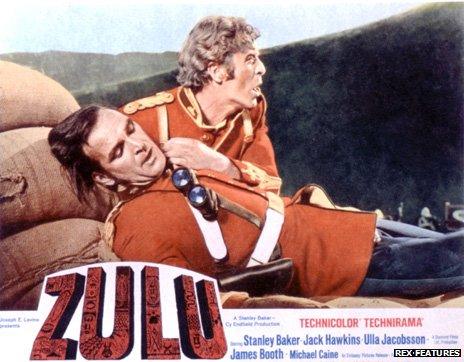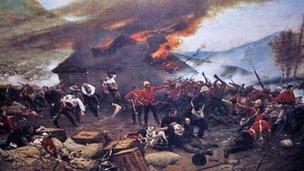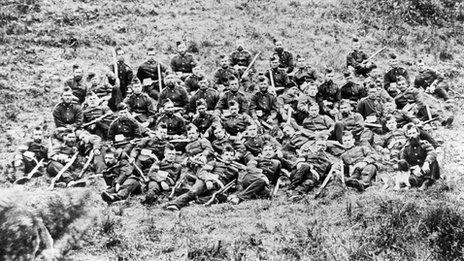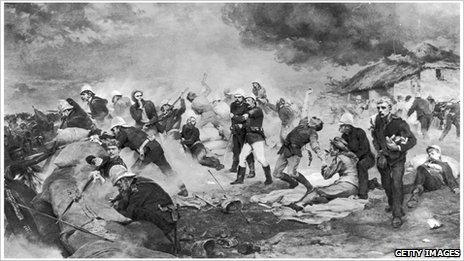Zulu movie Rorke's Drift VC winning battle myths
- Published

Lt John Chard (played here by Stanley Baker) and Lt Gonville Bromhead (Michael Caine) in the film Zulu
"Zulus - thousands of 'em." That is perhaps the line that most people remember from the 1964 film, Zulu.
The film recounts the battle of Rorke's Drift in 1879 when some 150 British soldiers held off around 4,000 warrior tribesmen whose land they had invaded.
It was an event which saw 11 Victoria Crosses awarded, more than for any single battle before or since.
That may in part be due to Prime Minister Benjamin Disraeli wanting to draw a veil over the huge defeat at Isandlwana earlier on the same day when a column of 1,800 well-armed British military were put to the spear.
However, an analysis of the citations will show that the award of each VC was justly deserved.

The painting The Defence of Rorke's Drift, by de Neuville, hangs at the regimental museum in Brecon
But, since it was made nearly half a century ago, the British movie about the seven score or so of men who successfully beat off a Zulu army has become a 139-minute cinematic treasure.
It has sparked an entire industry about what might be an otherwise largely forgotten colonial war and, for most people, it might as well be a documentary of what happened.
At least that is the view of Bill Cainan, curator of the Regimental Museum of The Royal Welsh, based at Brecon, Powys.
That is where the soldiers were based and in the film were portrayed as a fundamentally Welsh regiment, with Rhondda Valley-born actor Stanley Baker in the leading role.
Except that they weren't, says Mr Cainan, who himself served in the army for 37 years.
Industrialisation
Although the regiment had been based in Wales for six years by the battle of Rorke's Drift, they were still titled as the 24th Regiment of Foot (2nd Warwickshire Regiment).
For generations the regiment had recruited from the big strong farmhands working in the fields of Warwickshire and neighbouring counties.
But in the wake of the rapid industrialisation of Wales, and the south Wales valleys in particular, the Army had moved the regiment's base to Brecon to recruit from unskilled industrial labourers.
Yet even then no more than a third of the men in the regiment at that time would have considered themselves Welsh, says Mr Cainan.
He gives a lecture on Saturday at the National Army Museum in London on how the Anglo-Zulu War was received in Wales.
It is the sort of occasion where he comes up against the many myths perpetuated by Zulu, he says.
He said: "Stanley Baker just wanted to put some Welshness into it. He played the regiment as being the South Wales Borderers whereas it was still the 2nd Warwickshire Regiment.
"Mind you, it took the Army nine years - two years after Zulu war - to rename it, to reflect its geographical location."
Perhaps one of the defining moments of the film is the singing of the Welsh marching song, Men of Harlech.
As the surrounded British troops wait for the final onslaught, the opera singer Ivor Emmanuel, starring as Private Owen, leads them in a stirring performance to counteract the Zulu war chants.
'Expected to die'
Even though it is one of the memorable moments in the film, it probably never happened.
Mr Cainan said: "Most of the battle was at night. It finished at approximately midnight.
"The soldiers started with 24,000 rounds of ammunition. By midnight they were down to a 600-round box and any rounds they had left in their pouches. At midnight, they all expected to die.
"But by midnight the Zulus had shot their bolt. The battle had started at 4.30pm and they had taken quite heavy casualties.
"The British fire did not seem to be diminishing. The Zulus had jogged 15 miles to get there and swum a river in flood and they were relatively old regiments - in the uThulwana regiment the average age was 50.
"The Zulus were great warriors but even they had their limit. By midnight they thought 'that's it, finished'.
"If they had tried one more attack, they probably would have succeeded. The film does not convey that."
Yet Zulu has done marvellous things for the memory of the war, said Mr Cainan, even if it has also obscured somewhat the truth behind a battle that is still honoured by descendants on both sides.
He said: "It's a duality. Without the film, we would not have the interest in the Anglo-Zulu War,
"The medals that were issued would not be worth the money they are now."

The defenders of Rorke's Drift: B Company 2/24th Warwickshire Regiment
The two main Victoria Crosses, awarded to Lieutenant John Chard [played by Baker] and Lieutenant Gonville Bromhead [played by Michael Caine] are probably worth up to four times more than others VCs, he said.
"But because it is such a well-crafted film, many people treat it as a documentary.
"When you start to say 'that's not quite right' the eyebrows start to raise and people say 'but I've seen the film!'."
The line "Zulus - thousands of 'em" is uttered in the film by Colour Sergeant Bourne [played by Nigel Green].
Green was middle-aged, but Bourne was only 24. In fact, he was one of the youngest colour sergeants in the British Army.
And the line of his - that people misquote, actually - did he say it? Who knows?
Bill Cainan will be a speaker at the Zulus! Anglo-Zulu War Celebrity Speaker Day, external at the National Army Museum in London on Saturday 25 February.
- Published4 June 2011
